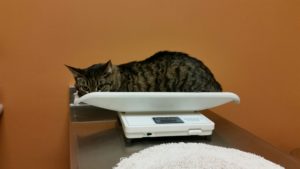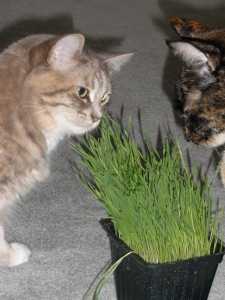 When you visit your veterinarian, he or she will almost always weigh your cat. The vet will then compare the new weight to the weight documented during previous visits and, of course, evaluate whether this is a good (healthy) weight for your cat.
When you visit your veterinarian, he or she will almost always weigh your cat. The vet will then compare the new weight to the weight documented during previous visits and, of course, evaluate whether this is a good (healthy) weight for your cat.
As with humans, obesity can be a problem for cats. A fat cat is more prone to some diseases—diabetes, for example. Excess fat is hard on the cat’s heart. Here’s a good site that discusses obesity in cats in clear language. And it offers solutions. http://www.catnutrition.org/obesity.html
It’s not easy to put a cat on a diet, especially when she isn’t an only cat. But it can be done.  And it may surprise you to learn that experts recommend doing away with kitty kibbles in order to reduce a cat’s weight. Exercise is another important treatment when attempting to pare down your butterball cat.
And it may surprise you to learn that experts recommend doing away with kitty kibbles in order to reduce a cat’s weight. Exercise is another important treatment when attempting to pare down your butterball cat.
On the other hand, if your cat has lost a lot of weight in a short period, that’s another red flag for the veterinarian. Something is wrong internally or emotionally. The cat might have bad teeth and it hurts him to eat. We learned that one of our perfectly healthy-seeming cats, who had stopped eating, did so because of a cancer in his throat—something we could not detect ourselves.
There are tricks for helping a cat put on weight, too. We helped bring Lily-kitty out of a crisis of weight-loss and illness by feeding her pumpkin—among other things. Of course, we also used Bach’s Rescue Remedy.
Keep an eye on your cat’s weight. A few pounds of sudden weight loss or gain can be crucial to a cat’s health—and is usually a signal that the cat has a health issue.





